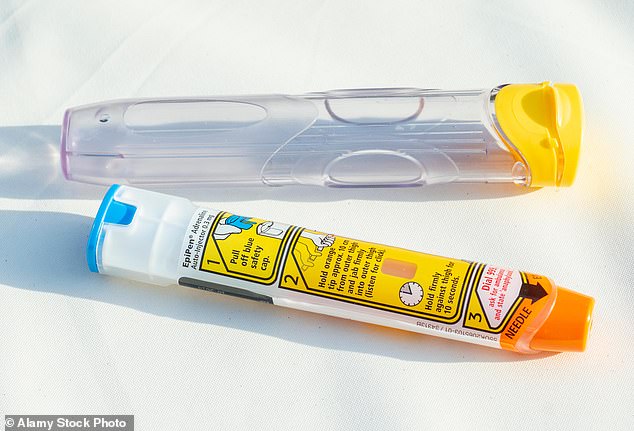- The girl fell ill within minutes of leaving a restaurant in the Gianicolense district
- Do you know more about the tragedy? Contact david.averre@mailonline.co.uk
A British teenager tragically died after suffering a sudden anaphylactic shock following a meal in a small pizza restaurant while on holiday with her family in Rome last week.
The 14-year-old, who had a severe peanut allergy, fell ill within minutes of leaving a restaurant in the Gianicolense district of the Italian capital, located a short walk from their bed and breakfast, on the evening of October 24.
By the time the family had made it back to their accommodation, the teen was barely able to breathe.
Paramedics descended on the scene and rushed her to San Camillo Hospital but she was pronounced dead on arrival.
Prosecutors and health inspectors are now investigating the case to establish whether restaurant operators may be culpable, suspecting that the girl died from an allergic reaction brought about by a ‘packaged dessert’, according to Corriere della Sera.


The family insisted their daughter was extremely vigilant about her allergy and typically informed restaurants about her dietary requirements.
The tragedy unfolded on the family’s first night in Rome last Thursday just hours after their flight touched down.
They had arrived in the capital for a week-long stay during which they planned to visit the world-famous landmarks – but first decided to grab a convenient evening meal at a nearby pizza restaurant before their trip began in earnest.
The family’s meal was simple: a few slices of pizza, drinks, and desserts to finish.
But as they left the restaurant and began the quick journey back to their B&B, the girl began experiencing considerable discomfort, and by the time they made it back to the accommodation was in the throes of anaphylaxis.
Her panicked parents called for help and alerted the B&B staff who immediately contacted emergency services.
When paramedics arrived, the teenager was unconscious and barely breathing, and by the time she arrived at the San Camillo hospital had already passed away.
Early investigations suggest that traces of peanuts, to which the girl was highly allergic, were present in the dessert she had consumed.
According to her family, the teenager had always been vigilant about her allergy, meticulously checking food labels and making sure that restaurant staff were informed about her condition.
It is unclear whether the restaurant staff had been made aware of her allergy on this occasion.
It is also unclear whether the girl had access to an EpiPen – a device those with severe allergies often use to treat anaphylaxis.
The incident has sparked a manslaughter investigation, with the prosecutor’s office and inspectors from the local health authority reviewing the restaurant’s allergen labelling and safety practices.
The case hinges on whether peanuts or their traces were present in the dessert and, if so, whether the restaurant failed to take the necessary precautions after being informed of the girl’s allergy.
The family has returned to England, awaiting the results of forensic tests that will determine when her body can be brought home.
MailOnline contacted the FCDO for comment.

Anaphylaxis, also known as anaphylactic shock, can kill within minutes.
It is a severe and potentially life-threatening reaction to a trigger, such as an allergy.
The reaction can often be triggered by certain foods, including peanuts and shellfish.
However, some medicines, bee stings, and even latex used in condoms can also cause life-threatening reactions.
According to the NHS, it occurs when the immune system overreacts to a trigger.
Symptoms include feeling lightheaded or faint; breathing difficulties – such as fast, shallow breathing; wheezing; a fast heartbeat; clammy skin; confusion and anxiety and collapsing or losing consciousness.
It is considered a medical emergency and requires immediate treatment.
An EpiPen – one of the most frequent treatments for anaphylaxis – injects epinephrine (adrenaline) into the body to counteract severe allergic reactions.
The epinephrine can trigger relaxation of airway muscles while reducing swelling and raising blood pressure to restore normal breathing and circulation.
